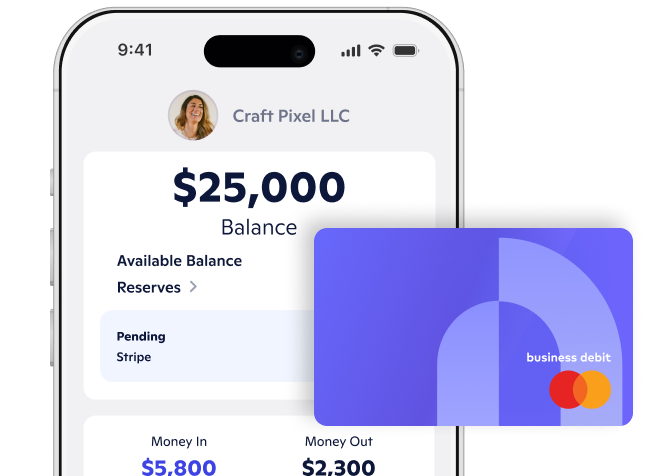
he number of bank accounts you should have as a business owner depends on your specific business needs. A detailed review of your company's financial goals and daily operations can shed light on your true income, expenses, savings, and the appropriate number of business bank accounts.
Although one business bank account may be sufficient if you're just starting out, you may need multiple bank accounts as your business grows. Regardless of how many bank accounts you choose to have, it's always good practice to keep your business finances separate from your personal finances.
In this article, you'll learn the advantages and disadvantages of having a single business bank account versus multiple accounts.
Determine your business's financial goals
Before trying to answer the question, "How many bank accounts should I have?" you should set some financial goals to get a clear picture of how your banking needs will change as you scale and grow your business. Admittedly, setting these goals can be daunting even if you've been in business for several years.
Business financial goals are specific objectives you set for your company's revenue, profit margin, savings, and other key financial metrics over a time period. These goals can be short term or long term but are typically set on an annual basis.
Here are some categories of business financial goals, keeping in mind that each will be a specific percentage or amount:
- Increased profit margin
- Lower operating expenses
- Increased quarterly and annual revenue
- Increased reserves or savings
Reasons to have a business bank account
Business bank accounts show how you earn, spend, and save money. Business checking accounts are similar to personal checking accounts. Both allow you to make deposits and withdrawals, write checks, make purchases, and send ACH (direct deposit) payments. Experts say that it's essential for entrepreneurs to have a separate bank account, especially a checking account, for legal reasons.
Keeping your personal expenses separate from your business expenses is also prudent when it comes to tracking. Day-to-day personal expenses are quite different from longer-term business expenditures you may have such as estimated quarterly taxes and payroll obligations.
Benefits of having a single business bank account
If you're a new business owner, it might be better if you start with a single business checking account instead of multiple ones. Here are some reasons why.
Avoid extra fees
With multiple business bank accounts, you may be required to pay separate and additional fees as well as maintain a minimum balance in each account. Consolidating your business funds in one account will position you better to meet the minimum-balance requirement.
Establish sub-accounts under a single business account
If you streamline your bookkeeping and business accounting under one account, you can open business sub-accounts. These reside under your primary business bank account. You can use sub-accounts for various purposes, such as tracking expenses, budgeting for payroll and taxes, and savings for emergencies and large purchases.
Minimize funds transfers
Your accountant or bookkeeper may find it tedious to constantly transfer funds between two or more accounts.
Downsides of having a single bank account
Consider these potential negatives of opening just one business checking account.
Difficulty tracking income and expenses
With only one business bank account structure, it may be difficult for you to see and track exactly what's coming in and what's going out. Consider having one account for receiving money (income) and another for paying your bills (business expenses).
It's more difficult to stay on top of your business budget and cash flow with only one bank account. Multiple accounts will give you more clarity into your business's financial situation.
Outgrowing a single account
A single business bank account may not be enough for your business to develop to its highest potential. You'll have to keep meticulous accounting records of your transactions within your account.
Benefits of having multiple business bank accounts
Having more than one business account is usually the right move as your operations expand.
Better cashflow visibility and management
If you open four separate business checking accounts, you could better manage your cash flow. Have a different account for payroll, income, taxes, and expenses. Each month, deposit earned revenue into your business income account and then transfer funds into your other three accounts. Pay yourself and your employees from your payroll account.
Simplifying your taxes
The IRS recommends that all businesses have separate bank accounts. If you're a sole proprietor, you're not required to have a separate business checking account, but from a tax perspective, it's still a good idea to have one. Using your personal checking account to run your business finances could be a headache come tax season, particularly if you haven't paid estimated quarterly taxes.
Also, if you are operating as a sole proprietor and the IRS audits your business taxes, you put your personal taxes at risk of being audited as well. If you file your taxes late, financial reports from your multiple business bank accounts can act as a stop-gap measure.
Staying on top of business spending
Guessing where your money is going each month can be eliminated with multiple checking accounts for paying your business expenses. You'll know at any given time whether you're sticking to your budget.
Downsides of having multiple business bank accounts
Is it ever bad to have multiple business bank accounts? It can be if you're not aware of your business's financial health and the various limitations of business checking accounts. You should understand these variables when deciding on checking accounts for your business.
- Fees: Some business checking accounts charge monthly maintenance fees. Know the minimum balance and transaction requirements to avoid paying them.
- Interest rates: You can earn interest on some business checking accounts. However, determine if the interest is worth it if you also have to pay fees on the account.
- Transaction limits: Some business checking accounts have a limit on the number of transactions that can be processed each month. The usual limit is 200. You usually have to pay a fee for each transaction over the limit.
- Cash deposit limits: There may be a limited number of cash deposits you can make into your business checking account each month without paying a fee. If your business is primarily a cash operation, a checking account with a high cash deposit limit would be best.
Takeaways
Opening multiple business checking accounts can be helpful in managing your company's finances, but it can also be tricky to manage more than one account at a time. However, having multiple business bank accounts can also minimize the stress of managing your finances. You'll know each month if you have enough money to cover your business expenses in an organized way.
Opening a business checking account with a business banking partner like Novo can help you achieve your business financial goals. With all of your banking on one simple and powerful platform, your business finances will thrive and grow. Sign up today to learn more.
Novo Platform Inc. strives to provide accurate information but cannot guarantee that this content is correct, complete, or up-to-date. This page is for informational purposes only and is not financial or legal advice nor an endorsement of any third-party products or services. All products and services are presented without warranty. Novo Platform Inc. does not provide any financial or legal advice, and you should consult your own financial, legal, or tax advisors.
Novo is a fintech, not a bank. Banking services provided by Middlesex Federal Savings, F.A.: Member FDIC.
%201.png)
.png)




